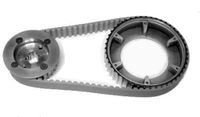Toothed Belt Drive: Difference between revisions
From DT Online
(Created Toothed Belt Drive) |
m (Corrected link) |
||
| Line 5: | Line 5: | ||
These are also known as [https://en.wikipedia.org/wiki/Belt_(mechanical)#Timing_belts '''Timing Belts'''] because of their common use in modern car and truck engines for this purpose. | These are also known as [https://en.wikipedia.org/wiki/Belt_(mechanical)#Timing_belts '''Timing Belts'''] because of their common use in modern car and truck engines for this purpose. | ||
They have corrugations moulded on to their underside which mate with corresponding grooves across the pulleys. If properly fitted and tensioned they do not slip and can be used as a quieter alternative to a '''[[Chain and Sprocket Drive]]'''. | They have corrugations moulded on to their underside which mate with corresponding grooves across the pulleys. If properly fitted and tensioned they do not slip and can be used as a quieter alternative to a '''[[Chain and Sprocket|Chain and Sprocket Drive]]'''. | ||
Revision as of 07:21, 30 April 2015
Both Vee belts and Flat Belts can be ribbed along their underside to improve contact with the pulleys but the most positive form of belt drive is provided using a Toothed Belt Drive.
These are also known as Timing Belts because of their common use in modern car and truck engines for this purpose.
They have corrugations moulded on to their underside which mate with corresponding grooves across the pulleys. If properly fitted and tensioned they do not slip and can be used as a quieter alternative to a Chain and Sprocket Drive.
